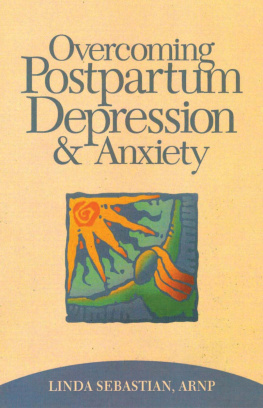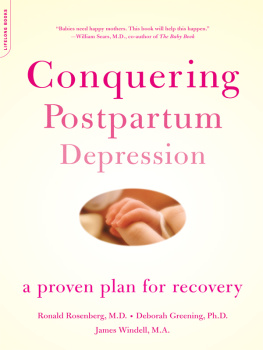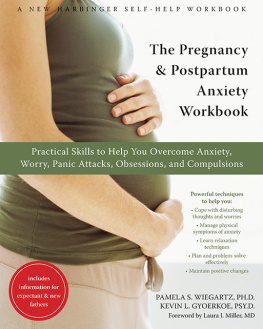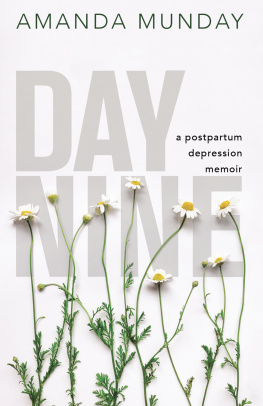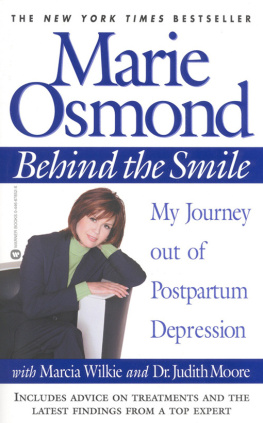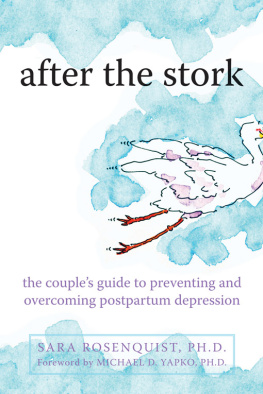
An Addicus Nonfiction Book
Copyright 1998 by Linda Sebastian. All rights reserved. No part of this publication may be reproduced, stored in a retrieval system, or transmitted in any form or by any means electronic, mechanical, photocopied, recorded, or otherwise, without the prior written permission of the publisher. For information, write Addicus Books, Inc., P.O. Box 45327, Omaha, Nebraska 68145.
ISBN 1-886039-34-8
ISBN 978-1-886039-34-6
Updated 2009
Cover design by Jeff Reiner /Cover redesign by Peri Poloni-Gabriel
Typography by Linda Dageforde
Illustrations by Bob Hogenmiller
This book is not intended to serve as a substitute for a physician, nor does the author intend to give medical advice contrary to that of an attending physician.
Library of Congress Cataloging-in-Publication Data
Sebastian, Linda, 1949
Overcoming postpartum depression and anxiety / by Linda Sebastian.
p. cm.
Includes bibliographical references and index.
ISBN 1-886039-34-8 (pbk. : alk. paper)
1. Postpartum depression. 2. Anxiety in women. I. Title.
RG852.S43 1998 98-16262
618.76 dc21 CIP
Addicus Books, Inc.
P.O. Box 45327
Omaha, Nebraska 68145
Web site: www.AddicusBooks.com
Printed in the United States of America
10 9 8 7 6
To the women and their families
with whom Ive been privileged to work
Contents
Types of postpartum depression, risk for depression, symptoms of postpartum depression, weaning the baby
Postpartum blues, onset of symptoms, causes, role of fatigue, risk factors, caring for self
Ranges of anxiety, physical reactions, causes of anxiety, types of anxiety disorders, managing anxiety
Types of depression, characteristics, causes of postpartum depression, effects on the baby and family, treatment, managing moods, risk of future depression
Understanding mental health treatment, intake interviews, diagnosis, roles of mental health professionals, choosing a therapist, expectations of therapy
When to use medications, brain chemistry, effects of medications, types of antidepressants, antianxiety medications, other treatments
Coping with a new baby and depressed mother, how fathers can help, the father-infant relationship, handling the emotions
The process of recovery, family stress, future pregnancy, signals of depression, seeking support
Acknowledgments
I wish to extend a special thanks to Tom Averill; Meredith Titus, Ph.D.; Elizabeth Davis; Jeff Ostergren; and especially Canda Byrne, A.R.N.P., who hung in there with me from start to finish. Thanks to Lee Cohen, M.D., for his pioneering work in the field of perinatal psychiatry and for his encouragement, and Martin Maldonado, M.D.; Robert Barnett, M.D.; Grace Morrison, M.D.; and Breck Edds, M.D., for sharing their perspectives and contributing to this book.
I thank Manya Schmidt, C.N.M., A.R.N.P., for her contributions and her guidance, and Joyce Venis, R.N., of Depression after Delivery for her contributions. I am also grateful to the Menninger Writers Group for their helpful comments, encouragement, and especially writing comradeship. A special thanks goes to Mary Ann Clifft, Director of Scientific Publications at Menninger, for her guidance and editing.
To Kathryn Zerbe, M.D.; Harriet Lerner, Ph.D.; and Glen Gabbard, M.D., many thanks for sharing your wisdom. To the staff at the Professional Library at Menningeryour help was invaluable to me.
Finally, I thank my familymy daughter Rene Almeling for her editing, research, and general giddiness about this project, my son David Almeling for his support, contributions, and the encouraging card at a time when I really needed it, and especially my husband, Guy Almeling, for his considerable faith in me, for making sure my computer was working, and for his persistent encouragement.
Introduction
L ike most new mothers or mothers-to-be, you probably have heard of postpartum depression. But, you probably thought that it happened to other women, and would never happen to you. Thats what I thought, too. During my first pregnancy, I viewed motherhood as a blissful and perfect time. But, after the birth of my first child, I found myself crying for no reason several times a day. Irritable and cranky, I often found myself in tears over the slightest problem. Because I could not determine why I was crying, I was constantly worried. I felt totally inadequate as a mother. Shame and fear that I was not going to be able to cope with this new person in my life overwhelmed me.
I had read all the pregnancy and new mother books, never imagining I would have such a reaction. After all, I had wanted this baby very much. So even though I thought I was prepared, I was caught off guard by the roller coaster of my moods. This scary time lasted two weeks before I began to feel better.
Fortunately, I had an understanding and helpful partner who took over the care of the baby when he got home at night so I could rest. I thought I was letting him down by not being a better mother for our new baby. A neighbor who had several children helped me through this time by assuring me that I was not going crazy, that this was normal, and that I would get over it. Her advice was simple: get as much sleep as you can and tell company not to visit for awhile. She did not tell me not to cry, or ask me why I was crying. This kind neighbors acceptance was so helpful. I dont know what I would have done without her.
Our society does not prepare the new mother and her partner for the overwhelming adjustment to parenthood. The childbirth classes we took emphasized only how to prepare for the big event: labor and delivery. We learned all about breathing and stages of labor. But there was little discussion about the adjustment period following the birth and no mention of how devastating postpartum blues can be, let alone the possibility of more severe depression. The myth that mothers instinctively love their children and always enjoy being mothers only increases the risk of problems for women. It does not prepare them for reality.
As a nurse, I have worked with women who experienced unexpected mood changes or uncomfortable tension after the birth of their babies. As a psychotherapist, I have seen many women and their families suffer from the effects of depression and anxiety. The lack of information only worsens the situation. Often, neither health care professionals nor the public have ready access to information about the emotional problems that occur after childbirth. As you will read, there are many reasons for this lack of information.
This book is for women who are experiencing mood changes or anxiety after delivery. It provides the kind of information that would have been helpful to me when, as a new mother, I thought I was going crazy.
The only thing that seems eternal and natural in motherhood is ambivalence.
Jane Lazarre
Novelist
1
The Unexpected and Unknown
I was so excited about this baby. We had waited four years after we were married and saved our money, so I didnt have to go back to work. I worried about the baby having all its parts or being healthy, but I didnt worry about me. When I couldnt stop crying after I got home with the baby, I was so scared and thought I was a terrible mother. No one told me this might happen.
Annette, 32-year-old mother
A nnettes anticipation of the birth of her child is very common. Most women expect an uneventful pregnancy and delivery. If anything, women usually worry more about the health of their babies than about their own health. For the majority of women, this time in their lives is, indeed, healthy. However, many women experience problems with depression and anxiety both during their pregnancy and after delivery. Because information about the potential emotional complications after childbirth is usually not shared with women, those who do have these problems often feel alone and isolated.
Next page
